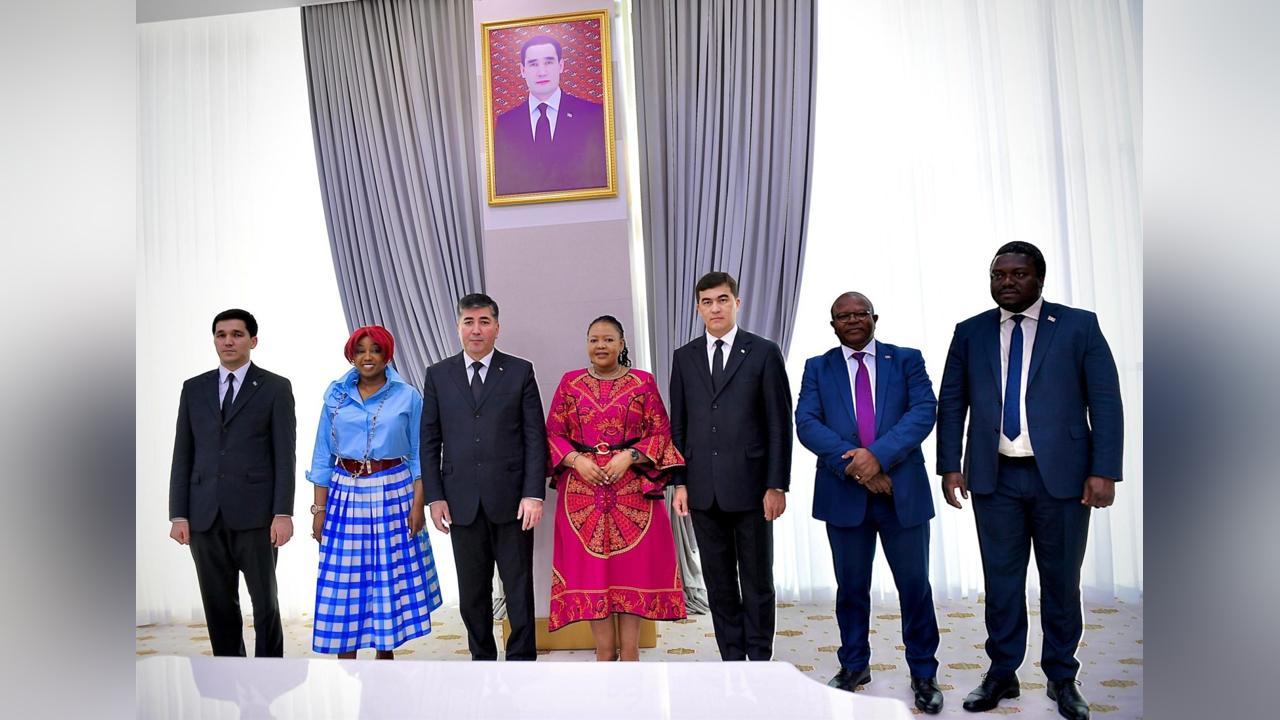Africa-Press – Eswatini. Eswatini and Turkmenistan have started talks to change the zero trade status between the two countries.
High level discussions, led by the ministry of Foreign Affairs and International Cooperation, were held to initiate a relationship aimed at fostering mutual economic and technological growth for both economies.
The Minister for Foreign Affairs and International Cooperation Pholile Shakantu, outlined key areas for collaboration, with a focus on information communication and technology (ICT), agriculture, mining, manufacturing, infrastructure and energy, among others.
The country was represented by the ministers for ICT Savannah Maziya, Commerce Trade and Industry Manqoba Khumalo, as well as Public Works and Transport Chief Ndlaluhlaza Ndwandwe. Also present were the country’s Ambassador to the United Nations Thami Dlamini and the Chief Officer in the King’s office Chief Mgwagwa Gamedze.
During the deliberations, Eswatini expressed keen interest in partnering with Turkmenistan on space and satellite technology, data centres, and the manufacturing of complex products such as SIM cards and electronic devices. To formalise this commitment, Eswatini will initiate official communication through its foreign affairs ministry to facilitate the signing of a cooperation agreement
The minister said the country would send correspondence to confirm Eswatini’s participation in an upcoming ICT exhibition in Turkmenistan in November, underscoring the nation’s enthusiasm for deepening technological ties. Energy cooperation was also highlighted as a priority, with Eswatini seeking to bolster initiatives in ICT and other sectors through sustainable energy solutions.
Infrastructure development emerged as another key area of focus. Eswatini proposed exploring the sale of bitumen to serve regional markets, leveraging its strategic position to facilitate trade. Additionally, the minister expressed interest in Turkmenistan’s raw material stock exchange, requesting further details to explore opportunities for purchasing products.
Textile trade was another significant point of discussion. Eswatini shared interest in importing cotton from Turkmenistan while indicating the existence of a growing textile sector that employs over 30 000 emaSwati, inviting Turkmenistan to looking into how the two countries can maximize on each others’ expertise. Agriculture was also on the agenda, with Eswatini keen to explore the export of its agricultural products, while exploring importation of wheat and rice grain from to Turkmenistan.
The mining sector was highlighted as presenting further opportunities, with Eswatini inviting Turkmenistan to explore its rich mineral resources such as iron ore and high quality coal. In the oil sector, discussions centred on securing fuel reserves through access to Turkmenistan’s raw products. Additionally, Eswatini’s sugar industry was highlighted as a potential export avenue, with plans to explore supplying sugar to Turkmenistan.
In closing, minister Shakantu thanked Turkmenistan for the productive discussions and insightful presentations from its ministries and state companies. “This marks the beginning of a fruitful relationship,” she said, expressing optimism about expanding cooperation into new areas as engagement deepens.
On the other hand the Turkmenistan’s ministers welcomed Eswatini’s interest in space and satellite technology, data centers, and the production of advanced products like SIM cards and electronic devices. They expressed readiness to formalize these efforts through a cooperation agreement, with details to be coordinated via diplomatic channels.
The ministers also extended an invitation to Eswatini to participate in Turkmenistan’s ICT exhibition in November, 2025. Energy was highlighted as a critical area of collaboration, with Turkmenistan eager to explore the country’s proposal for bitumen trade to serve regional markets. Eswatini’s interest in Turkmenistan’s raw material stock exchange platform was also welcomed, with the ministers pledging to provide detailed information to facilitate potential trade in various products.
On textile cooperation Turkmenistan expressed enthusiasm for exporting cotton to Eswatini while exploring opportunities to benefit from Eswatini’s established textile industry. In the oil sector, Turkmenistan responded positively to Eswatini’s interest in securing fuel reserves, offering to discuss the supply of raw materials. Additionally, they counrty noted Eswatini’s proposal to export sugar, expressing interest in exploring this trade opportunity.
Eswatini was thanked for its proactive engagement and praised the productive exchange of ideas, with the Turkmenistan ministers expressing optimism about expanding cooperation as discussions progress.
For More News And Analysis About Eswatini Follow Africa-Press







